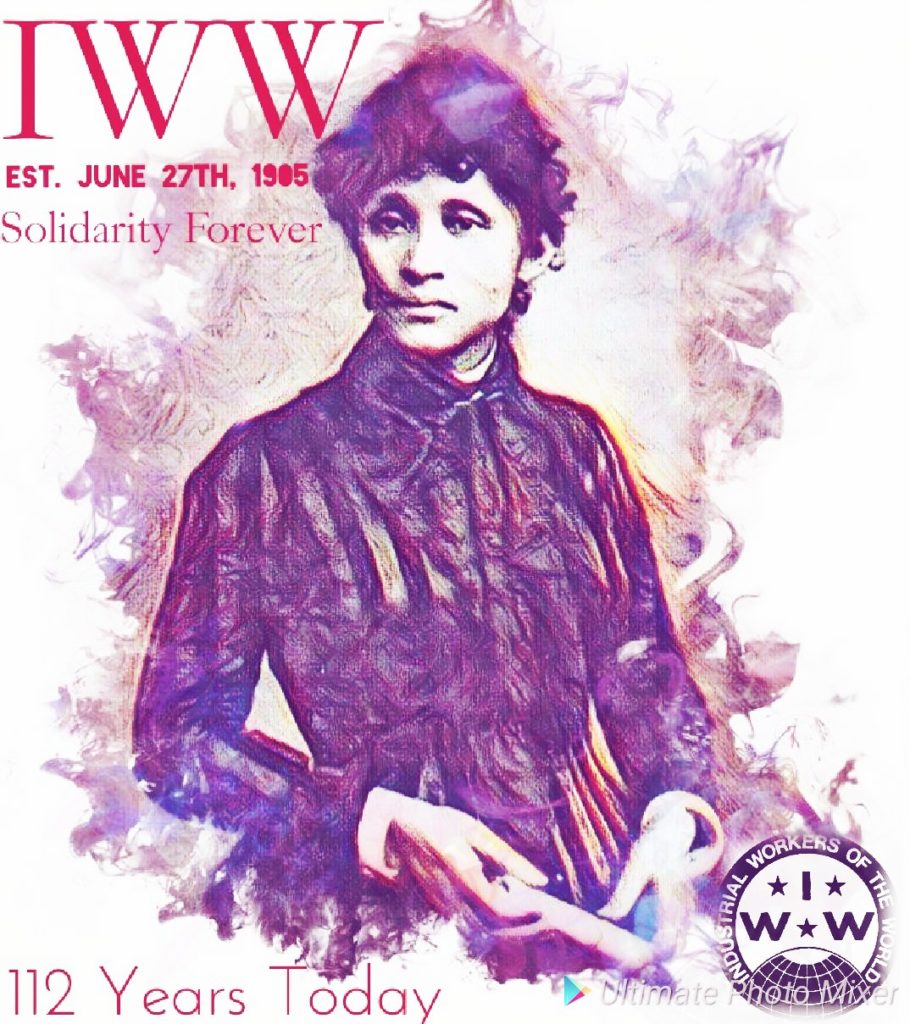
Founded 112 years ago this week, we celebrate the rich legacy of the Industrial Workers of the World (IWW). The union brought together a number of existing unions and radical currents to create an alternative to the conservative trade unions of time which promoted harmony between workers and capital and also practiced exclusion in their organizing along the lines of race, gender and skill. Today the IWW continues to organize and we celebrate it’s vision of building a labor movement committed to the emancipation of the working class.
These two excerpts are from the minutes of the founding convention of the IWW on June 27 and 28, 1905. William “Big Bill” Haywood was a veteran unionist with the Western Federation of Miners and key early figure of the IWW. Here he elaborates in one simple paragraph the founding vision of what the IWW aimed to build. Lucy Parsons was also a labor organizer of women textile workers and veteran activist in socialist and later anarchist politics who gained international renown for her campaign against the execution of her husband and Haymarket Martyr, Albert Parsons. Her speech articulates a key distinction on the left at that time around the method of ballot box reform versus the collective power of organized of workers and people to take control of means of life. Watch a short video on her life here.
William “Big Bill” Haywood
The opening address to the founding convention:
Fellow Workers: In calling this convention to order I do so with a sense of the responsibility that rests upon me and rests upon every delegate that is here assembled. This is the Continental Congress of the working class. We are here to confederate the workers of this country into a working class movement that shall have for its purpose the emancipation of the working class from the slave bondage of capitalism. (Applause).
There is no organization, or there seems to be no labor organization, that has for its purpose the same object as that for which you are called together to-day. The aims and objects of this organization should be to put the working class in possession of the economic power, the means of life, in control of the machinery of production and distribution, without regard to capitalist masters. (Applause).
The American Federation of Labor, which presumes to be the labor movement of this country, is not a working class movement. It does not represent the working class. There are organizations that are affiliated, but loosely affiliated with the A. F. of L., which in their constitution and by-laws prohibit the initiation of or conferring the obligation on a colored man; that prohibit the conferring of the obligation on foreigners. What we want to establish at this time is a labor organization that will open wide its doors to every man that earns his livelihood either by his brain or his muscle.
Lucy Parsons
Speech to the founding convention:
Now, what do we mean when we say revolutionary Socialist? We mean that the land shall belong to the landless, the tools to the toiler, and the products to the producers. Now, let us analyze that for just a moment, before you applaud me.
First, the land belongs to the landless. Is there a single land owner in this country who owns his land by the constitutional rights given by the constitution of the United States who will allow you to vote it away from him? I am not such a fool as to believe it. We say, “The tools belong to the toiler.” They are owned by the capitalist class. Do you believe they will allow you to go into the halls of the legislature and simply say, “Be it enacted that on and after a certain day the capitalist shall no longer own the tools and the factories and the places of industry, the ships that plow the ocean and our lakes?” Do you believe that they will submit? I do not.
We say, “The products belong to the producers.” It belongs to the capitalist class as their legal property. Do you think that they will allow you to vote them away from them by passing a law and saying, “Be it enacted that on and after a certain day Mr. Capitalist shall be dispossessed?” You may, but I do not believe it.
Hence, when you roll under your tongue the expression that you are revolutionists, remember what that word means. It means a revolution that shall turn all these things over where they belong to the wealth producers. Now, how shall the wealth producers come into possession of them? I believe that if every man and every woman who works, or who toils in the mines, the mills, the workshops, the fields, the factories and the farms in our broad America should decide in their minds that they shall have that which of right belongs to them, and that no idler shall live upon their toil, and when your new organization, your economic organization, shall declare as man to man and women to woman, as brothers and sisters, that you are determined that you will possess these things, then there is no army that is large enough to overcome you, for you yourselves constitute the army. (Applause). …
My conception of the strike of the future is not to strike and go out and starve, but to strike and remain in and take possession of the necessary property of production. If any one is to starve … let it be the capitalist class. They have starved us long enough, while they have had wealth and luxury and all that is necessary.
If you enjoyed this piece we recommend “The Next 100 Days: May Day and Worker Resistance Under Trump” and “A History of May Day: The Struggle for the Eight-Hour Day and Popular Power.” Read more on Lucy Parson’s speech here.
